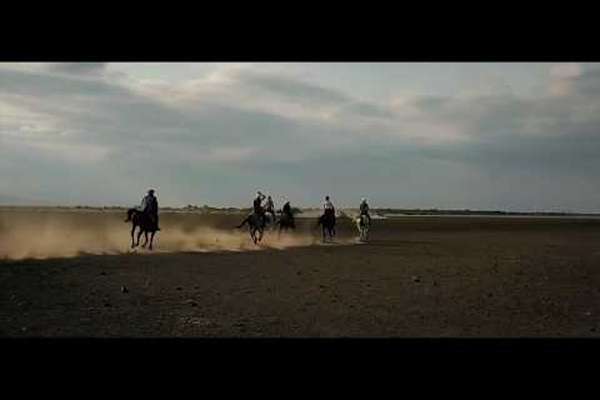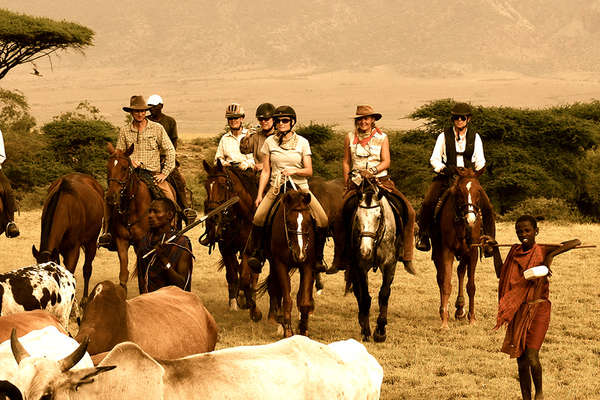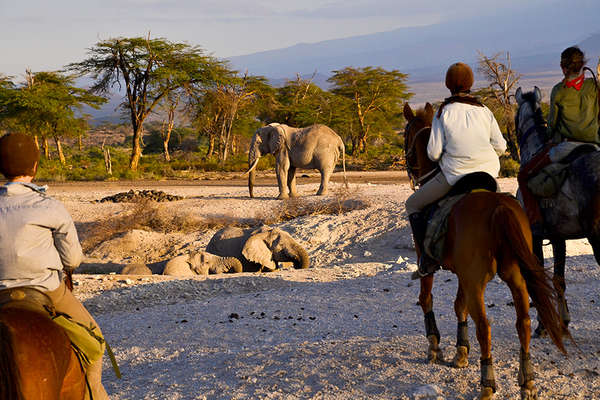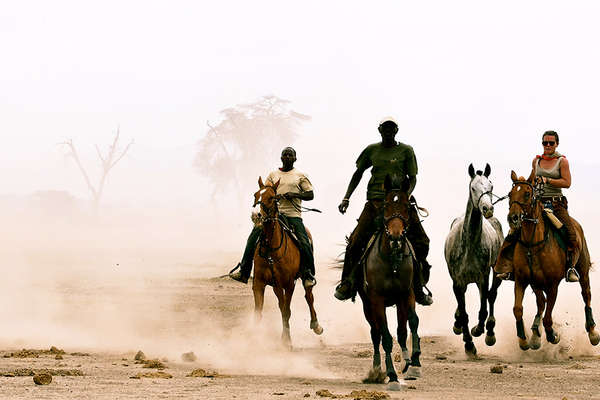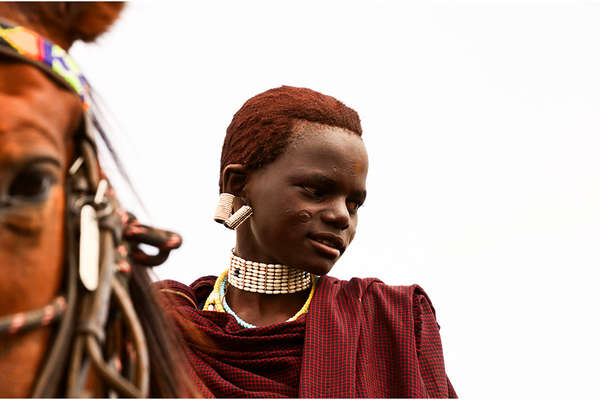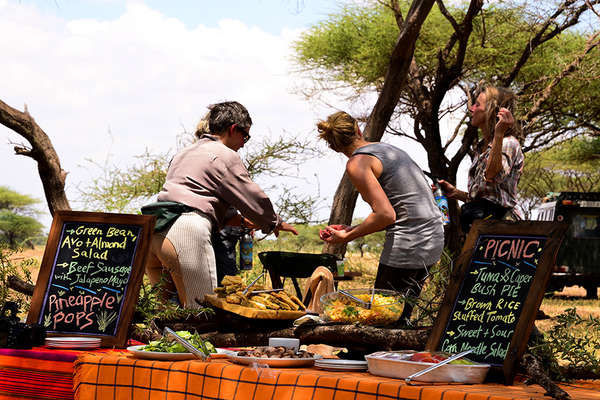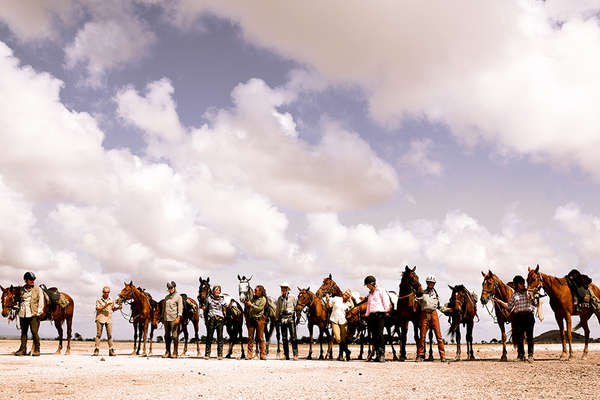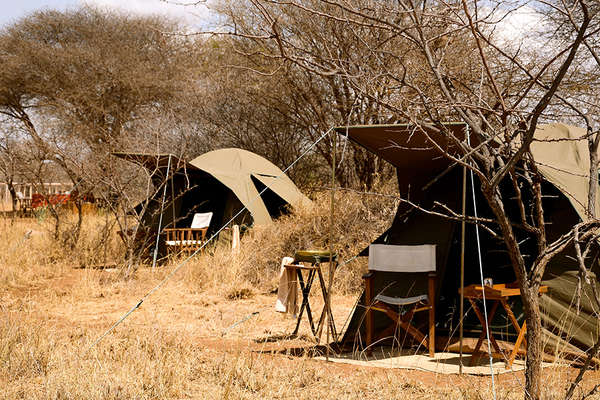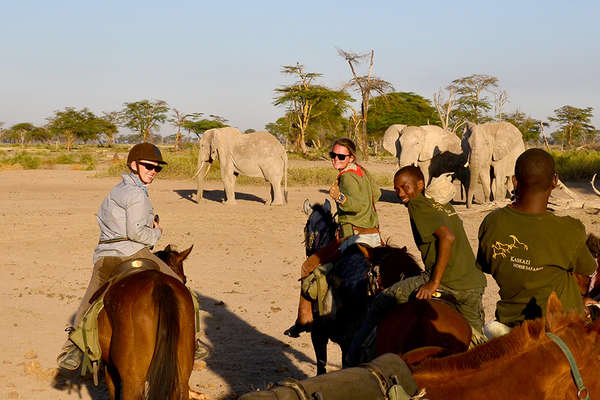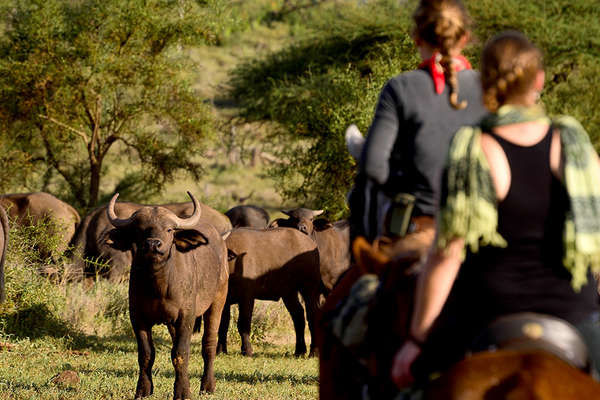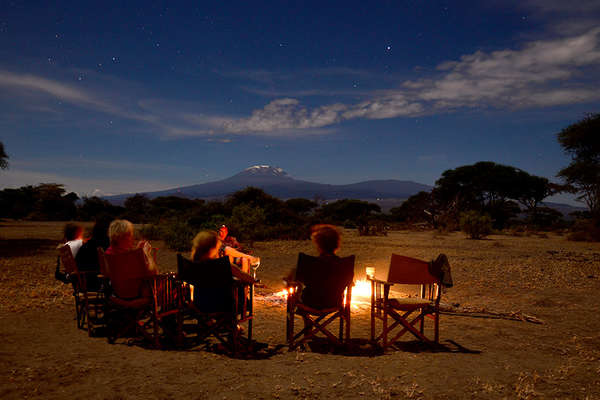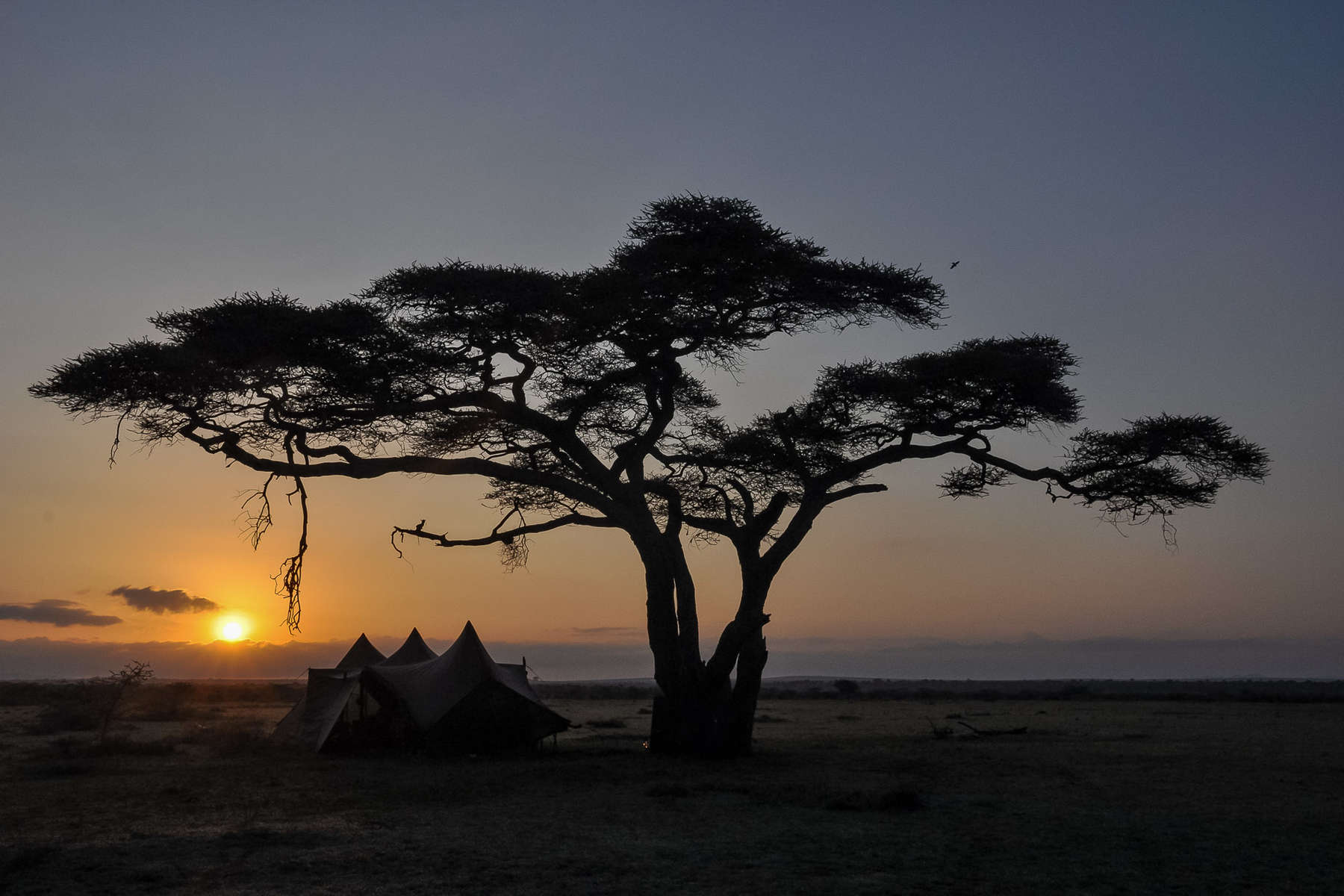
Itinerary
Highlights
- Big game area offering the chance to ride with elephant, giraffe, buffalo, zebra etc
- Opportunties for fast riding on the dried out pans of Lake Amboseli (weather permitting)
- There may be options for jumping, particularly around the cattle bomas
- Ride through traditional Maasai villages
- Experience the wonder of Mount Kilimanjaro, Mt Meru, Longido and Namanga
Dates & prices
Price details
- The above rates are per person, based on sharing a twin or double room and tent.
- There is no single supplement if you are willing to share a room/tent with another guest of the same sex. To guarantee your own room/tent there is a single supplement of $490/€440/£400 for the duration of the safari.
- Groups are usually a minimum of 4 and a maximum of 10 riders, plus guides.
- Wildlife Management Area (Park) fees are included. Although we try to keep this website updated to reflect recent changes on taxes and levies, they are subject to change without prior notice.
- Road transfers are included to/from Kilimanjaro airport or Arusha town. On the way back, your flight must depart after 2:00pm to allow time for the transfer. Private transfers can be organised at the cost of around $70/£60 per car if arriving a day early.
- Other departures are possible and can be planned on request throughout the year, except during April and May which correspond with the long rainy season in Tanzania.
- If guests are travelling with an extra bag that is not needed on the riding portion of their trip (as space is limited in the tents). Arrangements can be made to store extra bags for a fee of $20 per person.
- Please note that there is a rider weight limit of 85kgs/187lbs/13st3
- For those who are not keen horseriders or not confident enough, options for vehicle safaris and walking safaris can be arranged. Their itinerary will be tailored to individual needs and sample itineraries are available upon request
Please Note
The itinerary may be modified at anytime for security reasons, meteorological or events beyond our control such as blocked roads, rivers in flood, drought, strikes and local holidays. Equus Journeys, our local partners and their local guides will always strive to find the best solution and will alter the itinerary as needed.
The names of the hotels and accommodation are given for information only and depending on availability, they may be modified without notice and replaced by another of a similar standard.
Price includes
Support Team
1 additional guide for groups of 6+ riders
Logistic
1 support vehicle
1 assistant cook
1 horse equipped with saddle and bridle
Inland transports
Airport transfers at set times
Accommodation
Bedding
Meals
Additional equipment
Extras
Price doesn't include
Meals
Transports
International flights
Extra
Insurance
Optional
Accommodation
Equestrian info
Horses
Guide & local team
Out on safari the lead guide is either armed or carries a bullwhip and communicate over radios and cellphones, with a mobile station in each vehicle.
Minimum riding ability
Minimum riding ability
longer distance. A fit and proficient rider is of big advantage out on safari. There may be requirements to gallop out of danger and opportunities to jump (although these are optional).
Please note that there is a rider weight limit of 85kgs/187lbs/13st3
Pace
Tacking ability and participation
Trip conditions and Requested experience
Riders who do not ride regularly must get riding fit before joining this safari.
Please check with us before booking if you have any medical conditions as you will be far from medical help. A must to disclose any medical conditions, allergies, or medications that might affect your ability to ride safely.
You will meet different cultures and mentalities which requires acceptance of these differences and respect for others.
Equestrian equipment
We use English/polo saddles on this safari.
We recommend our riders to wear a helmet to the correct standard and you should bring your own to ensure a proper fit. Helmets are not available to borrow.
Travel info
Comfort
Mobile camp (6 nights): They are comfortable and spacious, being 4 X 4 meters with mosquito netted doors and windows to allow for ventilation but remain insect proof. Each tent is provided with a carpet, towel rack, bedside table and water bottle, bed and cotton linen and a solar light. Outside each tent there is a veranda with chairs and a washstand that you share with your tent partner. Each tent has its own bush toilet and bucket shower. The toilet is a traditional short drop style toilet with a nice wooden toilet seat over a metal box with open sides. Our motto is "Rhinos cover it please do the same". There is a small mound of dirt with a trowel next to the toilet seat for this purpose. The shower is a traditional star gazing canvas bucket.
Meals
Breakfast is traditional and includes fresh fruit juice
Lunch is either a picnic from the saddle bags or a selection of light dishes produced from the support vehicle in a shady spot.
Dinner is three courses and a mixture of local and international dishes with fresh salads and freshly baked bread.
Drinks are included whilst on safari but payable locally at lodges added on at the beginning/end.
Climate
There are two rainy seasons: the long rains extend from mid-March to early May, with the majority of the rain in April. Evenings can be cool or even cold.
The short rains are from early November to mid December - during this period the rain is not constant but falls in heavy showers during the day.
The hottest months are December to February.
Around Mount Kilimanjaro there is often snowfall overnight in January and February, and freezing cold nights in July and August.
Tips
Packing list
Head
- Equus Journeys strongly recommend that you wear a riding helmet and that you take your own to ensure a correct fit.
-Sunhat for when not riding
- Sunglasses - with a cord attached so they don't fly off when riding
- Buff or bandana
Upper body
- Long sleeved shirts provide protection from the sun and thorns
- T-shirts
- Fleece, jumper or jacket - the evenings can be cold
- Waterproof jacket - the rains can be difficult to foresee and it's better to be prepared
- Casual clothes for the evening
Legs
- Lightweight, comfortable riding trousers or jodhpurs - we recommend riding in them at home before taking them on holiday to ensure they don't rub
- Shorts for lazy lunchtimes
- Casual clothes for the evening
Hands and Feet
- Comfortable riding boots. We recommend short boots with half chaps but you may wish to take long chaps to protect against thorns. We don't recommend taking your favourite long leather boots in case they get damaged
- Sandals, flip-flops or trainers for moving around the lodge and camp
- Gloves - your hands are particularly exposed to the sun whilst riding
Nightwear
Our Recommendations
- Please don't take a hard sided suitcase. Your luggage should be soft sided for easy transportation between camps.
- Wherever possible you should wear neutral colours, such as beige, brown or natural bush colours for riding as bright colours, such as red, yellow or white can startle the wildlife and they will see you long before you've seen them
- We recommend travelling in your riding boots and carrying your hat and some riding clothes in your hand luggage - then if your luggage goes astray you are still able to ride!
Other useful items
- Waterbottle to keep in the saddlebags
- Swimsuit - for the Lake Natron ride
- Towel. A camping towel will both dry quicker and pack lighter
- Binoculars for viewing game
- Camera and high capacity memory card. Spare battery
- Bumbag for carrying your camera and small items whilst riding
- Headtorch or small torch for moving around camp at night
In your luggage
- Any liquids, such as shampoo, moisturiser, deodorant unless they are less than 100ml and all bottles can fit in a small, clear, plastic ziplock bag
In your hand luggage
- Any valuables, such as your camera, ipod, ipad etc.
- Your riding hat
Medical kit - A First Aid Kit is always carried in the back up vehicle on safaris, although we ask guests to bring any required medics as well as malarial prophylaxis.
- Sunscreen and lip balm - must be high factor
- Insect repellent, preferably containing deet
- Any medication you regularly take
- Blister plasters in case of any rubs
- Antiseptic cream, plasters, aspirin, anti-histamine, insect-bite salve etc...
- Spare prescription glasses/contact lenses
- Ear plugs, particularly if you are a light sleeper
- Anti malarial tablets and Yellow Fever Certificate (check with your doctor)
Sustainable tourism
- Travel light. It's a little known fact, but the lighter you pack, the better for the environment as heavy bags will produce higher emissions (when flying a plane or driving a car!).
- Reduce plastic waste. Take your favorite reusable bottle with you. Avoid single-use bags, cups, or straws.
- Preserve nature. Always take your rubbish with you during the ride and recycle them. Leave all the flowers or plants as you found them, and never get too close when observing wildlife. Make sure to use eco-friendly products such as body wash or laundry detergent (if camping) to protect both your skin and the environment.
- Choose your experiences carefully. Respect animal life by not participating in any activities that abuse wild animals (shows, elephant rides, etc.).
- Support local populations. Buy local handicrafts, be respectful of customs, and learn about the culture of local communities.
- Share! Raise awareness among your family and friends about sustainable tourism.
Did you know?
Did you know?
On this horseback safari you ride through the Enduimet Wildlife Management Area (EWMA) which lies in the Longido district of Tanzania, near the border with Kenya. Situated between the national parks of Amboseli and Kilimanjaro, the EWMA serves as an important trans-national migratory route and dispersal area for many species of wildlife, in particular the elephant. It remains the only corridor that connects to the Kilimanjaro ecosystem. The Enduimet area is also home to 17,000 people with the dominant ethnic group being Ilkisongo Masai, who cultivate the land for agriculture and cattle.
The EWMA has rangers which frequently patrol the corridor to provide access for wildlife to move from Kilimanjaro to Amboseli. These rangers help to prevent poaching, and the Enduimet corridor lost no elephant to poachers in 2013 - proof that community based conservation can work.

